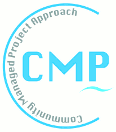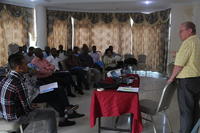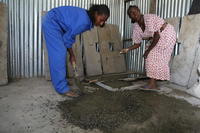COWASH Hygiene and Environmental Health Planning Conducted
Following the official opening of the workshop, Abate Benti, a representative from the Ministry of Health, briefed participants about the upcoming National Hygiene and Environmental Health (HEH) Strategy. According to him, the new strategy targets to upgrade the current 28% access of improved sanitation and hygiene services. In his presentation Abate underscored, the shift of focus from quantity to quality, that a transition from coverage to access.
The issue that draw a lot attention in the HEH discussion session was the definition of Improved Latrine. A number of participants raised the concern that the definition is not conclusive and binding in practice. Thus, they believed it could be the source of unreliable data that misinform the status of accesses. Abate, in his response to the concerns from the house, said the definition puts into consideration the socio-economic status of the community. According to this strategic document, an improved latrine is a latrine with at least a pit, hole-cover, slab flour, cleanable, super structure and hand washing facility.
In a bid to further highlight this strategy, Arto Suominen, the Chief Technical Advisor of COWASH Federal, presented the 10 strategic objectives of the HEH. That, in addition to raising awareness, it also helped as the springboard from where COWASH hygiene and environmental health transformation. Thereafter, Mr. Suominen also continued in briefing the contextual framework of the intended COWASH HEH transformation. The draft strategy indicators the project transition to transform the household latrine including further decentralizing sanitation marketing practices. The yet to be approved strategic document recommends a holistic approach in which public places get as much attention as household latrines in the rural places.
On the second day of the workshop, participants had an opportunity to visit Limat Sanitation Marketing enterprise in Medabayzena district. The enterprise which was established in 2012 in producing improved stoves, now transformed into producing and selling sanitation products. After the conclusion of the visit, visitors reported back their findings that were acquired through interview and observation. Although the enterprise is reported to be running smoothly, the margin of profit is not encouraging. Participants also observed lack of license would undermine the enterprise if not addressed in the shortest possible time. In overall participants have taken home some important lessons which would be very useful in the establishing and /or strengthening the sanitation marketing enterprises.
The two day workshop was concluded with the participants submitted the revised plan for the period of the project. It is to be recalled that representatives from the heath bureaus from all COWASH regions were unusually present and active in the workshop.



